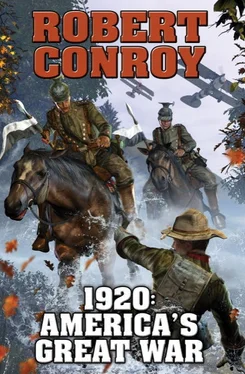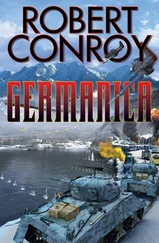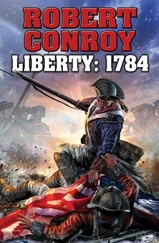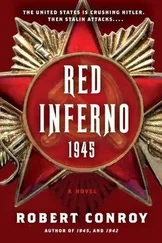Some German artillery lifted and tried to find the American guns. Carville slapped Luke on the shoulder. “Beautiful. You actually are hurting them. Liggett and Harbord do know what they’re doing. Just a shame you’re going to lose anyhow. Just too damn many Germans, y’know.”
Overhead, a German plane’s engine sputtered. It was trailing smoke and began tumbling to the ground. Luke smiled grimly. “We had some of our precious machine guns hidden along those roads, Reggie. Now their damned planes will be more careful when they attack our trucks. A little bird told us where the attack would come.”
“Ah, a little bird. God bless little birds, warm puppies, and fluffy kittens. Have a drink.”
Luke accepted. He and Ike had a number of little birds hidden behind German lines, risking their lives and reporting on the massive buildup of forces in this sector. The reports had come by short wave or, incredibly, by telephone. The Germans had neglected to cut all the lines. The Germans were so contemptuous of the American Army that they hadn’t even made a real attempt to hide what they were doing. Yes, they would doubtless carry this defense line, but their arrogance would cost them.
“Good grief, look at that!” Reggie exclaimed. A score of armored trucks had crossed from the German trenches and were advancing, their machine guns spitting fire.
“This, Major Martel, might just be the wave of the future, the gas-driven vehicle used as a weapon.”
The German bombardment stopped suddenly. The Germans were still more than a quarter of a mile away from the American trenches.
“A ruse,” Luke exclaimed and Carville nodded his understanding. The Germans would wait until the bunkers had emptied of men and the trenches were full. Then they would shell the trenches, although briefly, as their men were getting very close and might be hit by their own shells.
As predicted, the Germans again opened fire. Luke and Reggie looked at each other. The men had been warned about this trick. Had they enough discipline to wait?
The Germans were at the barbed wire and their guns ceased, although American artillery and trench mortars picked up the pace. Again, Germans fell by the score, proving that Americans were alive in the trenches, but they kept on advancing. The German armored vehicles tried to push their way through the barbed wire and, in many cases, failed. Several halted, stuck in shell holes, while others hung up in thickets of wire where they were easy targets for American machine guns. Only a few made it to the trenches, where they were raked by guns. Soft spots were found and the halted trucks began to burn and blow up.
Germans infantry were within yards of the trenches and began hurling their distinctive potato masher grenades. American threw their own grenades in a brief but bloody duel.
However, nothing stopped the German infantry who cut their way through the wire and pushed on to the American trenches. Some Germans fell onto the wire so their comrades could climb across them. More Germans were shot, but still more Germans came on.
“Nobody said the fucking Huns weren’t brave,” Carville muttered.
The Germans clambered into the American trenches and Luke could only begin to imagine the horror of close in, hand-to-hand combat. Along with their Springfields, many Yanks had submachine guns and sawed off shotguns, ideal for killing at close quarters. The Germans had their MP18 9mm automatic weapons with their thirty-two round magazines. They might be awkward and difficult to aim, but did it matter when you were trying to kill someone at a distance of ten feet?
American soldiers began pulling back from the trenches. Some were running for their lives, understandably, Luke thought, while whole units began to disintegrate.
“I think we should leave,” Carville suggested and Luke concurred. “The Huns won’t advance any farther this day. You’ve hurt them, but, like I said, they will prevail. They will clear out the trenches to their left and right and gather for a second attack.”
Luke picked up his gear. He had a report to give to Ike and perhaps Liggett. “When?”
“A couple of days. No more than that.”
* * *
Martel was filthy and disheveled, but Liggett wanted information immediately. Carville had prudently disappeared, doubtless to communicate to his British masters.
Even though the first of three fortified lines had been lost, Liggett and the other generals were somewhat pleased. Their soldiers had endured a heavy bombardment, the likes of which hadn’t been seen on American soil since Gettysburg, and had prevailed. They had emerged from their bunkers and mowed down large numbers of Germans soldiers.
D.W. Griffith had provided film coverage that had transfixed them. The film canisters would be sent north to Canada as diplomatic mail and make their way to the East Coast. When properly edited, the American people who would finally see war in all its horror. Griffith’s films showed the dead and the dying in graphic detail.
“How many casualties did we suffer?” Liggett asked.
“Rough estimate is five thousand,” Ike responded.
“And theirs?”
“Based on what Martel and I have seen and discussed, probably close to the same.”
Liggett shook his head. “Attackers are supposed to lose more than defenders.”
“Perhaps it will happen that way the next time, sir,” Harbord said. “Our men are becoming experienced and, even though they reacted well, the next time they will perform even better. To use a cliché from a previous war, they have seen the elephant.”
Liggett reluctantly concurred. “However, we cannot get into a battle of attrition. They still outnumber us significantly, even if some of their troops are heading out to take over the defense of the passes from the Mexicans.” Liggett paused. “Anything else of note?” he asked.
“One thing, sir,” Luke said. “Their armored trucks were a disaster on wheels. They sent about twenty of them in the attack and lost at least half. Trucks can’t traverse dug-up ground and they don’t have the power to bull a path through concentrated barbed wire. You need a much bigger and stronger vehicle for that.”
Luke caught Liggett and Harbord glancing at each other. What were they not telling?
Harbord leaned forward. “Yet our armored trucks performed well in Texas, did they not?”
“Yes sir, but circumstances were very different. For one thing, the terrain was fairly flat and, for another, the Mexicans were out in the open and not dug in. That also meant not much in the way of barbed wire. My counterpart in Lejeune’s corps also said that a number of trucks still had difficulty. I hate to repeat myself, but today’s trucks just aren’t strong enough.”
“Good observation, Major,” said Liggett, “Very good indeed.”
* * *
Major General Douglas MacArthur was livid with scarcely contained fury. Theirs was the first in a long series of troop trains and they had been stopped just outside of Seattle. The plump army major in front of MacArthur was named Small but was standing tall before MacArthur’s attempts to dominate him. MacArthur wasn’t all that tall himself, but he was intimidating. A few yards away, Sergeant Tim Randall and Lieutenant Taylor tried to make themselves very, very tiny. They were concerned that they had just picked a terrible spot to rest.
Major Small folded his arms across his ample stomach and glared back. “I understand your frustration, General, but I have my orders. It’s more than eight hundred miles from Seattle to San Francisco. There’s effectively just about one rail line going that way and a lot of it goes through some godawful terrain and, oh yes, it’s still winter.”
MacArthur’s face had begun to turn red. “Major, I fully understand the weather and distance, but I am in the forefront of three divisions, nearly fifty thousand men, ready to assist the brave young men who are holding the lines at San Francisco. They are laying down their lives and fifty thousand good men are just sitting here. We must have trains. Or do you expect us to walk those eight hundred miles?”
Читать дальше












